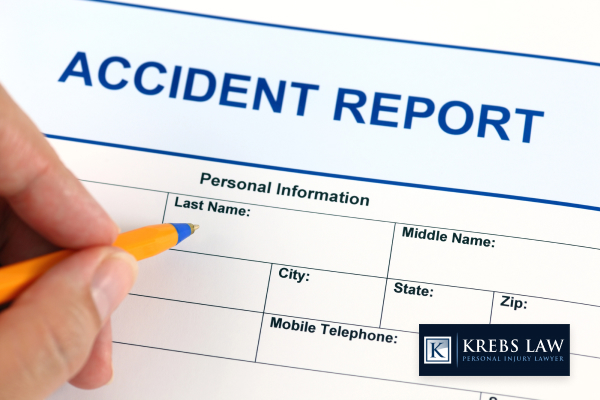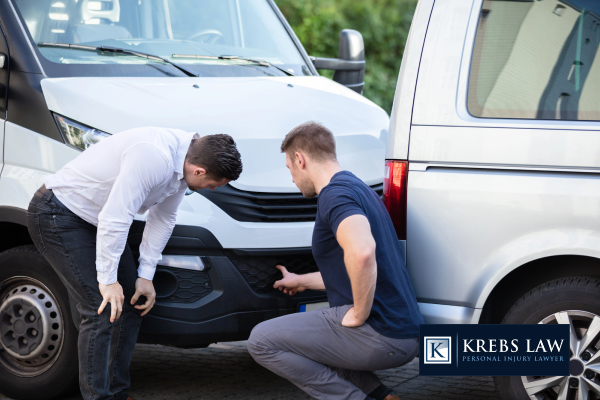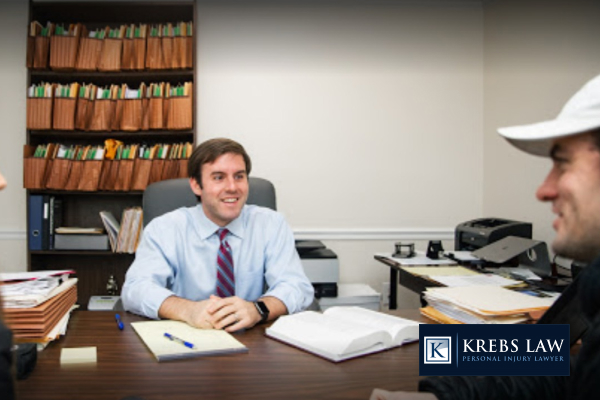This page was written, edited, reviewed & approved by JR Krebs following our comprehensive editorial guidelines. JR Krebs, the Founding Partner, has years of legal experience as a bankruptcy attorney. Our last modified date shows when this page was last reviewed.

When an accident happens with a fleet vehicle, knowing the correct steps to follow can protect your rights. Fleet accidents bring special challenges. They involve business vehicles, company insurance, and rules that regular car crashes don't have. Whether a fleet vehicle hits you or you drive one, the right response helps you get fair compensation.
This guide shows you each step after the accident occurs. Krebs Law Personal Injury Lawyers covers what to do right away, how to document everything, how to deal with insurance, and when to call a lawyer. Following these steps helps you avoid mistakes that could hurt your case.
First, ensure your safety. If your car runs, move it away from traffic to the shoulder or a parking lot. Turn on your hazard lights to warn other motorists and prevent further crashes. Stay inside your vehicle if moving it could cause more harm. Next, call the police immediately, even for a minor fender bender. A police report is crucial for the claims process. The officer will document the accident, including details about the vehicles involved, injured persons, and traffic controls at the scene.
Assess the scene for serious injuries and immediately dial 911 if medical attention is needed. Be sure to share contact and insurance information with the other driver, such as license details, policy numbers, and vehicle registration. Take photos of all vehicles, license plates, and any damage. Note if hazardous materials are involved. Avoid admitting fault or signing statements at the scene. If the other motorist or party asks for a recorded statement, politely decline until you consult a lawyer.
Be wary of stolen vehicles or suspicious behavior. Document everything carefully. Knowing the fair market value of your damaged vehicle can strengthen your position when negotiating with insurance providers. Stay calm and focused. Your actions right after the auto accident greatly impact your case. Following these steps ensures you protect your rights and helps you get fair compensation.

Fleet vehicle crashes differ from regular car accidents in several ways. They involve company insurance and business interests. Fleet accidents often mean dealing with the company's insurance adjuster, not just another driver. Understanding these differences helps you handle your claim better.
Fleet companies train their drivers to prevent accidents. These drivers know how to protect their employers. They call their office right away. Soon, fleet managers or supervisors might show up. While this feels overwhelming, remember you have rights, too. The key is protecting those rights when dealing with professional drivers.
You'll face different challenges with fleet accidents:
These factors make fleet accident claims more complex than regular crashes.
Check yourself for injuries first. The accident happened fast, and adrenaline hides the pain. Look for cuts, bruises, or swelling. Test if you can move without sharp pain. Some severely injured people don't feel it right away.
Call for medical treatment if anyone seems hurt. Emergency workers check injuries properly. They document everything for your claim. Getting medical attention creates important records. Your insurance company needs these records to pay medical bills later. Don’t delay seeking help even if you feel okay; some injuries show symptoms hours or days later.
Take photos of the scene of the accident immediately. Use your cell phone or disposable camera. First, take wide shots showing where all vehicles are. Then, photograph each car's damage. Get pictures of license plates and the other vehicle, too.
Record video of the crash scene. Walk around while filming. Point out important details like traffic lights and road conditions. Show any property damage to signs or barriers. This footage proves what conditions existed when the crash happened.
Get witness information before they leave:
When dealing with fleet accidents, collecting information takes extra effort. Fleet drivers carry special documents. They follow company rules about information exchange. You need to be just as thorough to protect yourself.
Get these details from all drivers involved:
Take photos of all documents. This ensures accuracy later. If the fleet driver won't provide something, write down their refusal. Get their reason in writing if you can.

Tell the police officer just the facts. Don't guess about what happened or admit fault. For fleet accidents, officers often spend more time checking commercial vehicle records. They might review driver logs or inspection reports. Cooperate, but stick to what you saw.
Fleet companies have their own reporting rules. The driver calls their dispatcher right away. This starts the company's accident process. File your report with your insurance agent quickly. Let them know this involves a commercial vehicle. This changes how they handle your claim.
Commercial vehicles follow special federal rules. Large trucks must report crashes to government agencies. Companies keep detailed records of all accidents. Knowing these rules helps you get all the documentation you need.
Write everything down while it's fresh. Include:
Fill out the accident report form completely. Use simple words to describe what occurred. Avoid accepting responsibility or accusing the other driver of being at fault. Just state facts like "The fleet vehicle entered my lane." Avoid emotional language.
Submit your report to your insurance company as soon as possible. Keep copies for yourself. The other driver's insurance company might ask for a statement, too. You don't have to give one without talking to a lawyer first.

Let investigators figure out who caused the crash. What seems obvious might not be true. Even saying "I'm sorry" can hurt your claim. The insurance adjuster might twist your words. Fleet companies train drivers to avoid accidents. You should do the same.
To cut costs, insurance providers frequently explore methods to lower claim payments. They use your words against you. This matters more with fleet accidents because companies have the resources to fight claims. Exchange information but save explanations for later.
Professional investigators determine fault using the following:
Insurance companies use every statement as evidence. Saying "I'm fine" might stop you from claiming injuries later. Comments about being tired or distracted become ammunition against you. The insurance adjuster's job is to pay less on claims.
Watch out for these harmful statements:
Avoid giving extra details or explanations at the scene. Keep your answers brief and polite. Remember, anything you say can be used to reduce your claim. It is best to wait for your insurance agent or lawyer before making statements.
Crash investigators use science to find out what happened. They study skid marks and vehicle damage carefully. For fleet accidents, they also check GPS data and electronic logs. This shows exactly how fast the vehicles involved in the accident were moving.
Fleet accidents often have hidden factors that affect the insurance claim. Investigators might discover mechanical failures or driver fatigue violations. Unsafe company policies and poor vehicle maintenance are other common issues. Sometimes, drivers feel pressure to meet deadlines, which can cause mistakes.
All these factors help determine who is responsible. Investigators gather evidence without bias. Their findings are important for your insurance claim. They make sure the facts are clear before fault is assigned. This protects your rights and helps you get fair compensation after the accident.

Get checked by a doctor even without obvious injuries. Fleet vehicles cause major force in crashes. Internal injuries don't always show immediately. Seeing a doctor creates a medical record linking injuries to your accident.
Insurance companies argue that delayed treatment means injuries aren't accident-related. Early medical attention protects your right to compensation. It documents injuries that might worsen later. Your health matters most, but proper records help your claim, too.
Doctors spot injuries you might miss. They check for:
Whiplash happens often in crashes with large trucks. Your neck snaps back and forth quickly. Pain might not start until days later. Without treatment, whiplash causes long-term problems.
Brain injuries worry doctors the most. Even small head bumps can cause serious issues. Watch for these symptoms:
Don't ignore emotional trauma, either. Many people develop anxiety or a fear of driving after fleet accidents. These psychological injuries need treatment, too. They're real parts of your injury claim.
Call a personal injury attorney when facing complex liability issues. Fleet accidents often involve multiple responsible parties. The driver, the company, and even maintenance contractors might share faults. When the insurance company fights your claim, having a lawyer on your side is crucial.
Serious crashes that result in medical expenses and lost wages, especially, require legal assistance. Fleet accident cases often lead to bigger settlements because of the higher stakes involved. Insurance companies tend to fight harder to minimize payouts in these claims. Experienced attorneys understand how to properly value your case, including future medical needs and ongoing care.
Seeking legal help early is important. Evidence can disappear quickly, and witnesses may forget key details over time. Without legal advice, you might accept an unfair settlement that does not cover all your damages. A skilled lawyer will protect your rights and negotiate for fair compensation.
Many personal injury attorneys offer free consultations. This allows you to review your case without any cost or obligation. During the consultation, the lawyer will explain your options and what you can expect. Don’t wait to get help. The sooner you contact an attorney, the stronger your case will be.

At Krebs Law Personal Injury Lawyers, we handle fleet accident cases regularly. Our attorneys know how to investigate these crashes. We identify all responsible parties. We fight corporate insurance companies for maximum compensation. Our experience helps you level the playing field.
We offer free consultations with no obligation. During this meeting, we will review the details of your accident. We assess your injuries and damages. We explain what your case might be worth. You pay nothing unless we win. This lets you focus on getting better while we handle the legal work.
Don't wait to call us. Fleet accident cases need quick action. Evidence can vanish fast. Contact our Tuscaloosa office today. Let our team protect your rights against the fleet company's insurance adjusters. The sooner you call, the stronger we can build your case.

J.R. is dedicated to providing personalized representation, avoiding a one-size-fits-all approach. He tailors his strategy to the unique challenges and needs of each client and case, ensuring focused and individualized attention.
His practice mainly covers Plaintiff’s Personal Injury, including car and 18-wheeler accidents, slips and falls, dog bites, defective products, and wrongful death. He also handles commercial disputes on contingency, with experience in contracts, construction, and probate. For any dispute headed toward litigation, J.R. develops an aggressive strategy to maximize your recovery through negotiation, arbitration, or trial.
"*" indicates required fields